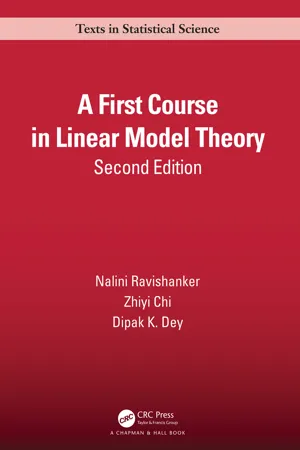
- 528 pages
- English
- ePUB (mobile friendly)
- Available on iOS & Android
A First Course in Linear Model Theory
About this book
Thoroughly updated throughout, A First Course in Linear Model Theory, Second Edition is an intermediate-level statistics text that fills an important gap by presenting the theory of linear statistical models at a level appropriate for senior undergraduate or first-year graduate students. With an innovative approach, the authors introduce to students the mathematical and statistical concepts and tools that form a foundation for studying the theory and applications of both univariate and multivariate linear models. In addition to adding R functionality, this second edition features three new chapters and several sections on new topics that are extremely relevant to the current research in statistical methodology. Revised or expanded topics include linear fixed, random and mixed effects models, generalized linear models, Bayesian and hierarchical linear models, model selection, multiple comparisons, and regularized and robust regression.
New to the Second Edition:
- Coverage of inference for linear models has been expanded into two chapters.
- Expanded coverage of multiple comparisons, random and mixed effects models, model selection, and missing data.
- A new chapter on generalized linear models (Chapter 12).
- A new section on multivariate linear models in Chapter 13, and expanded coverage of the Bayesian linear models and longitudinal models.
- A new section on regularized regression in Chapter 14.
- Detailed data illustrations using R.
The authors' fresh approach, methodical presentation, wealth of examples, use of R, and introduction to topics beyond the classical theory set this book apart from other texts on linear models. It forms a refreshing and invaluable first step in students' study of advanced linear models, generalized linear models, nonlinear models, and dynamic models.
Tools to learn more effectively

Saving Books

Keyword Search

Annotating Text

Listen to it instead
Information
1
Review of Vector and Matrix Algebra
1.1 Notation
Table of contents
- Cover
- Half Title
- Series Page
- Title Page
- Copyright Page
- Dedication
- Table of Contents
- Preface to the First Edition
- Preface to the Second Edition
- 1 Review of Vector and Matrix Algebra
- 2 Properties of Special Matrices
- 3 Generalized Inverses and Solutions to Linear Systems
- 4 General Linear Model
- 5 Multivariate Normal and Related Distributions
- 6 Sampling from the Multivariate Normal Distribution
- 7 Inference for the General Linear Model-I
- 8 Inference for the General Linear Model-II
- 9 Multiple Linear Regression Models
- 10 Fixed-Effects Linear Models
- 11 Random- and Mixed-Effects Models
- 12 Generalized Linear Models
- 13 Special Topics
- 14 Miscellaneous Topics
- A Multivariate Probability Distributions
- B Common Families of Distributions
- C Some Useful Statistical Notions
- D Solutions to Selected Exercises
- Bibliography
- Author Index
- Subject Index
Frequently asked questions
- Essential is ideal for learners and professionals who enjoy exploring a wide range of subjects. Access the Essential Library with 800,000+ trusted titles and best-sellers across business, personal growth, and the humanities. Includes unlimited reading time and Standard Read Aloud voice.
- Complete: Perfect for advanced learners and researchers needing full, unrestricted access. Unlock 1.4M+ books across hundreds of subjects, including academic and specialized titles. The Complete Plan also includes advanced features like Premium Read Aloud and Research Assistant.
Please note we cannot support devices running on iOS 13 and Android 7 or earlier. Learn more about using the app